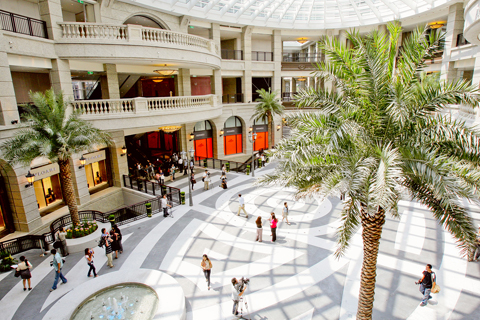The brand new shopping mall Bellavita held a soft opening yesterday to warm up for a heated retail war in Taipei City’s Xinyi District (信義) next month.
With 6,316 ping (20,879m²) of floor space on a 2,260-ping plot of land, Bellvita houses nearly 20 international luxury brands including Bulgari, Hermes, Tod’s and others.
S. H. Leung (梁秀卿), chairwoman of Bellavita, said before a ribbon-cutting ceremony that it had been her longstanding dream to run a “European-style” mall in Taiwan and that she was glad the dream had finally come true.

PHOTO: WANG WEN-LIN, TAIPEI TIMES
“It took five years to build Bellavita,” said Leung, wife of Quanta Computer Inc’s (廣達電腦) vice chairman and president C.C. Leung (梁次震). “Bellavita, which means beautiful life, will make shopping a relaxing and pleasant experience.”
Quanta chairman Barry Lam (林百里) was also present at the ceremony.
He did not make any comments on the mall or his firm, the world’s largest contract notebook computer maker.
An European-style building located on Songren Road, Bellavita will compete with the Taipei 101 Shopping Mall, Shin Kong Mitsukoshi Xinyi Department Stores (信義新光三越) and the New York New York Shopping Center (紐約紐約) for customers in the district.
Bellavita will gradually open its remaining floors over the next month.
The mall will also house restaurants with Michelin Guide stars, operators said.

To many, Tatu City on the outskirts of Nairobi looks like a success. The first city entirely built by a private company to be operational in east Africa, with about 25,000 people living and working there, it accounts for about two-thirds of all foreign investment in Kenya. Its low-tax status has attracted more than 100 businesses including Heineken, coffee brand Dormans, and the biggest call-center and cold-chain transport firms in the region. However, to some local politicians, Tatu City has looked more like a target for extortion. A parade of governors have demanded land worth millions of dollars in exchange

An Indonesian animated movie is smashing regional box office records and could be set for wider success as it prepares to open beyond the Southeast Asian archipelago’s silver screens. Jumbo — a film based on the adventures of main character, Don, a large orphaned Indonesian boy facing bullying at school — last month became the highest-grossing Southeast Asian animated film, raking in more than US$8 million. Released at the end of March to coincide with the Eid holidays after the Islamic fasting month of Ramadan, the movie has hit 8 million ticket sales, the third-highest in Indonesian cinema history, Film

Taiwan Semiconductor Manufacturing Co’s (TSMC, 台積電) revenue jumped 48 percent last month, underscoring how electronics firms scrambled to acquire essential components before global tariffs took effect. The main chipmaker for Apple Inc and Nvidia Corp reported monthly sales of NT$349.6 billion (US$11.6 billion). That compares with the average analysts’ estimate for a 38 percent rise in second-quarter revenue. US President Donald Trump’s trade war is prompting economists to retool GDP forecasts worldwide, casting doubt over the outlook for everything from iPhone demand to computing and datacenter construction. However, TSMC — a barometer for global tech spending given its central role in the

Alchip Technologies Ltd (世芯), an application-specific integrated circuit (ASIC) designer specializing in server chips, expects revenue to decline this year due to sagging demand for 5-nanometer artificial intelligence (AI) chips from a North America-based major customer, a company executive said yesterday. That would be the first contraction in revenue for Alchip as it has been enjoying strong revenue growth over the past few years, benefiting from cloud-service providers’ moves to reduce dependence on Nvidia Corp’s expensive AI chips by building their own AI accelerator by outsourcing chip design. The 5-nanometer chip was supposed to be a new growth engine as the lifecycle